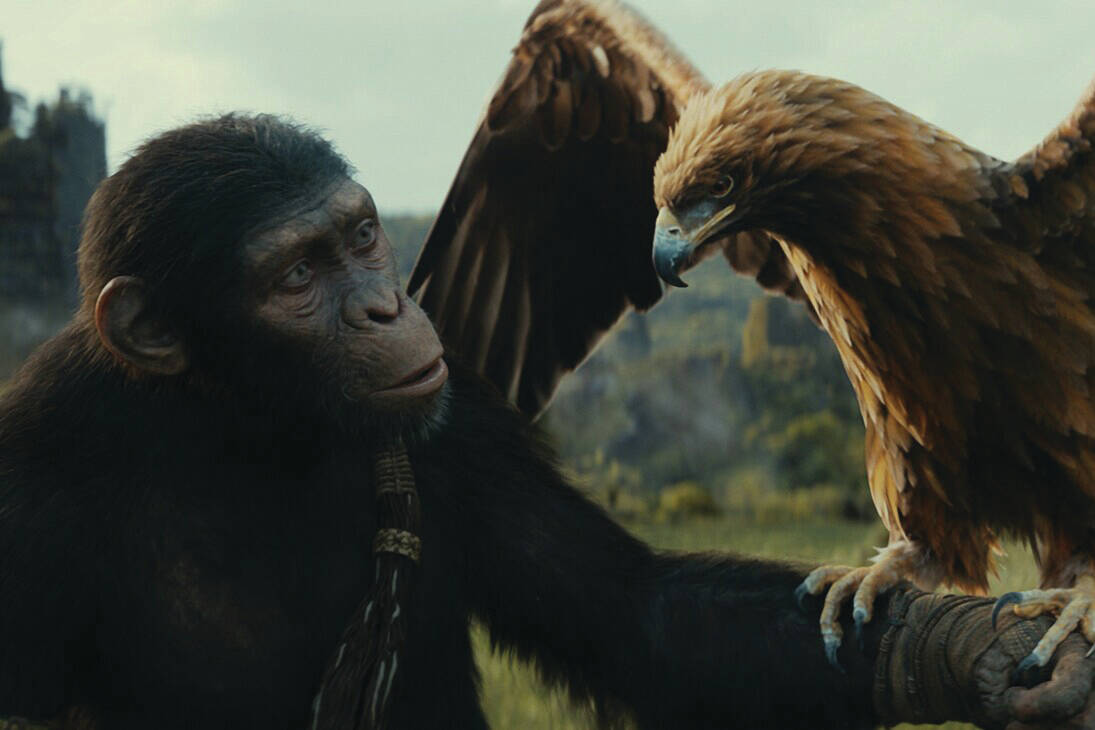It’s so great to have “Planet of the Apes” back in my life.
Though I had been nervous about corporate studios picking up the pieces and continuing the franchise after the stellar trilogy of films — released from 2011 to 2017 — that followed the ape Caesar as he sought a better life for his people, “Kingdom of the Planet of the Apes” immediately both distinguishes itself as an interesting new thing and revives the ideas explored in those films. It sets up a very bright future for an underrated titan of science fiction cinema.
“Kingdom of the Planet of the Apes” picks up roughly 300 years after 2017’s “War for the Planet of the Apes,” and uses that leap forward in time to tell a story that feels more rooted in fantasy than the post-apocalypse vibe of its predecessors.
It follows Noa, a young ape played by Owen Teague who is a member of a small ape clan. Humanity is, now, so far gone that the apes refer to them as “echoes.” The film opens with a rite of passage, takes time to establish Noa and his friends, and depicts a verdant, peaceful world.
Noa is drawn from his home to go on an adventure aglow with fantasy-trappings. He makes friends, uncovers some of the mysteries of a world nearly forgotten, and finds himself at odds with a charismatic king — Proximus Caesar played by Kevin Durand.
Of course, though humanity is on the back foot, it persists — specifically in the form of Freya Allan’s Mae, a human being who exhibits a spark of intelligence and perception that the other remnants lack. She connects with Noa and the two start an uneasy friendship despite their prejudices for one another.
The film isn’t quite as thematically and emotionally dense as some of its immediate predecessors. It falls back on many tried and true “Planet of the Apes” concepts of coexistence, prejudice and civilization, but puts a subversive twist on them in ways I’m desperate to see expanded in follow-ups.
Also central to the film are thoughts on education and religion. The faded knowledge and teachings of not only human society but also the long-dead Caesar drive conflict in the film as many of its characters ultimately seek only greater understanding of the world around them.
“Kingdom of the Planet of the Apes” is an adventure film that’s full of an earnest sense of wonder. It proves “Planet of the Apes” still has interesting ideas kicking around and serves as a more than worthy successor to the trilogy of films that came before.
It’s exciting, it’s poignant and it’s stunning visually. Now on the fourth of the modern “Apes” films, it’s almost easy to forget just how incredible the emotional performances and sophisticated effects must be to realize each of its characters and the world they reside in.
“Kingdom of the Planet of the Apes” is listed as “Coming Soon” at the Homer Theatre.
Reach reporter Jake Dye at jacob.dye@peninsulaclarion.com.


